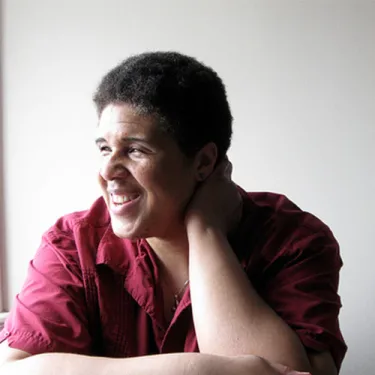Constance Merritt
Visiting Poet

Born in Pine Bluff, Arkansas, and educated at the Arkansas School for the Blind in Little Rock, Constance Merritt holds B.A. and M.A. degrees from the University of Utah and a Ph.D. in Creative Writing from the University of Nebraska, in Lincoln, where she currently resides.
Merritt is the recipient of two Pushcart Prize nominations and an Academy of American Poets College Prize. Her first collection of poems, A Protocol for Touch, won the Vassar Miller Prize in Poetry and was published this year. Judge Eleanor Wilner called her “a poet to defeat categories, to oppose ‘the tyranny of names’ with a poetry that sets its own terms of encounter…tender and austere, formal and intimate at once.”
Select Poems
An “intelligence test” used to establish “mental
and hereditary illness” in Germany from 1933.
Some 320,000 – 350,000 people were sterilized in
accordance with these dubious criteria.
– The Racial State
What is your name?
What are you?
Where is this place?
Who brought you here?
Who are the people around you?
Where does the sun rise?
What does it cost to send a letter?
Why do children go to school?
What does it mean to boil water?
Why does one build houses higher in towns than in the countryside?
Who was Bismarck?
Who was Luther?
What kind of state do we have at present?
What does Christmas mean?
Who discovered America, and when?
What is the difference between:
Mistake and lie? gift and loan?
Saving and parsimony? pond and stream?
Ladder and stairs? having/not having babies?
What is the difference now between night and day?
From A PROTOCOL FOR TOUCH (University of North Texas Press, 1999)
Listen, in the distance the sound of calling voices:
Hysteric wind shouting down leaves’ loud brawling voices.
Innocence lies complicit as paper, while breathing
Comes hard to everything in winter, stalling voices.
The student wakes in a garden strewn with odd flowers;
They lie like stones under his head, not wholly voiceless.
That summer a hole grew in her soul; consult her socks
For proof. Echoes haunt the pavement recalling voices.
A mystery: why we never tasted magnolias?
Why they alone remained unkissed and falling, voiceless?
She learned her colors from the deluxe Crayola box;
The colors cried out their names with mad, rolling voices.
Lilac lay like lack on the land, littering the lake;
Faith, bright fish, leaps in all the water’s flowing voice says.
The proximate alone merits constant attention;
The dumb heart learns to follow where the darling voice is.
From A PROTOCOL FOR TOUCH (University of North Texas Press, 1999)
for Emily Dickinson
I christen you my mother, and you,
Like her, refuse to give straight answers-
She, silent; you, forever talking slant.
And I’ve exhausted all questions except
The one to which I am answer
And therefore cannot form.
You deal your words like blades or cards
And to keep the game mysterious
You won’t divulge the rules. I never win.
And if I come to you because much time
Has passed since my last meal, you tell a tale
About a crumb that you and Robin feast
Upon, leaving some for charity.
I know it is not true still I believe.
“There’s a pair of us,” you say, “don’t tell-”
And I will keep your secret much too long
Because the racket of this living shames
Me too. The guiltless are not innocent.
I want to lose this innocence, leave
All guilt behind, learn to live loudly,
Become someone, but you won’t tell me how.
I cannot live as you before me did.
It is another time, another place,
A different set of circumstances,
A different work to live.
We have no rest to give each other.
The leaves they turn and turn. With tenderness
I touch you out of sleep; I wake to your
Wild words: much madness is divinest sense.
We cannot reach each other now though I,
Too, dwell in possibility. Escape
Is on my tongue, still, I can no more run
Away from you than crawl into your arms
From A PROTOCOL FOR TOUCH (University of North Texas Press, 1999)